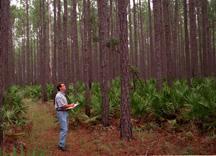Conservation Easements

A conservation easement is a legal agreement between a landowner and a land trust, government agency, or other entity that maintains land in agricultural and/or natural uses to protect the owner's agricultural and/or conservation interests. Private landowners may wish to consider donating or selling some of these rights.
Each conservation easement is designed to consider both the landowner's needs and the conservation objectives. For example, conservation easements may be designed to allow continued farming or ranching activities, hunting, and other recreational uses. An easement might apply to just a portion of the property. In most cases, conservation easements are perpetual, so any land use restrictions remain if the land is sold or passed on to heirs. Typically, these future development rights are restricted and are recorded on the deed.
Conservation easements are managed by federal, state, and local governmental agencies as well as non-governmental organizations (NGOs). Although conservation easements are essentially similar in principle, different organizations may have different priorities depending upon their mission, and these priorities will influence the type and degree of land use restrictions required in the easement. For example, some organizations may prioritize the protection of large natural areas, while the goal of others may be to maintain agricultural lands in production.
-
Financial Benefits

Economic decisions strongly influence land use decisions. But personal values also influence how private landowners make decisions on their own land. Many landowners realize the strong ecological or agricultural value of their land and wish to legally protect it from being converted or zoned for other purposes. Various types of financial benefits are available with conservation easements. Easements may result in direct payments, tax relief, and reduction of estate taxes when passing land to heirs.
Four potential tax savings are associated with donating a conservation easement: income tax, real property tax, federal gift and estate tax, and estate tax exclusion.
-
The New Tax Incentive

Congress recently passed a new law to enhance the tax benefits of donating a voluntary conservation agreement. This donation can be one of the smartest ways to conserve important natural, historic, or agricultural resources and protect America’s natural heritage. Landowners will maintain their private property rights and potentially realize significant federal tax benefits at the same time. These new incentives make it easier for average Americans - including working family farmers and ranchers - to donate land. The legislation:
Raises the maximum deduction donors may take from 30 percent of income in any year to 50 percent
Enables qualifying farmers and ranchers to deduct up to 100 percent of their adjusted gross income,
Allows donors to take deductions for their contribution for a maximum of 16 yearsThese changes allow many modest-income landowners to deduct much more than they could under the old rules, bringing increased fairness to the tax code. Part of the law also tightens appraisal standards, which had sometimes been abused by landowners collaborating with appraisers to unfairly increase their deductions. Landowners should always get personalized legal and accounting advice before making land conservation decisions.
-
Organizations
Many public and private land trust organizations participate in conservation easement, land donation, and charitable sale of land programs. Determining who these organizations are is time consuming and frustrating for private landowners.
Additional Resources
- Conservation Easements | Living Green TV Episode
- Land Trust Alliance
- Conservation Trust for Florida
- Tall Timbers Land Conservancy



